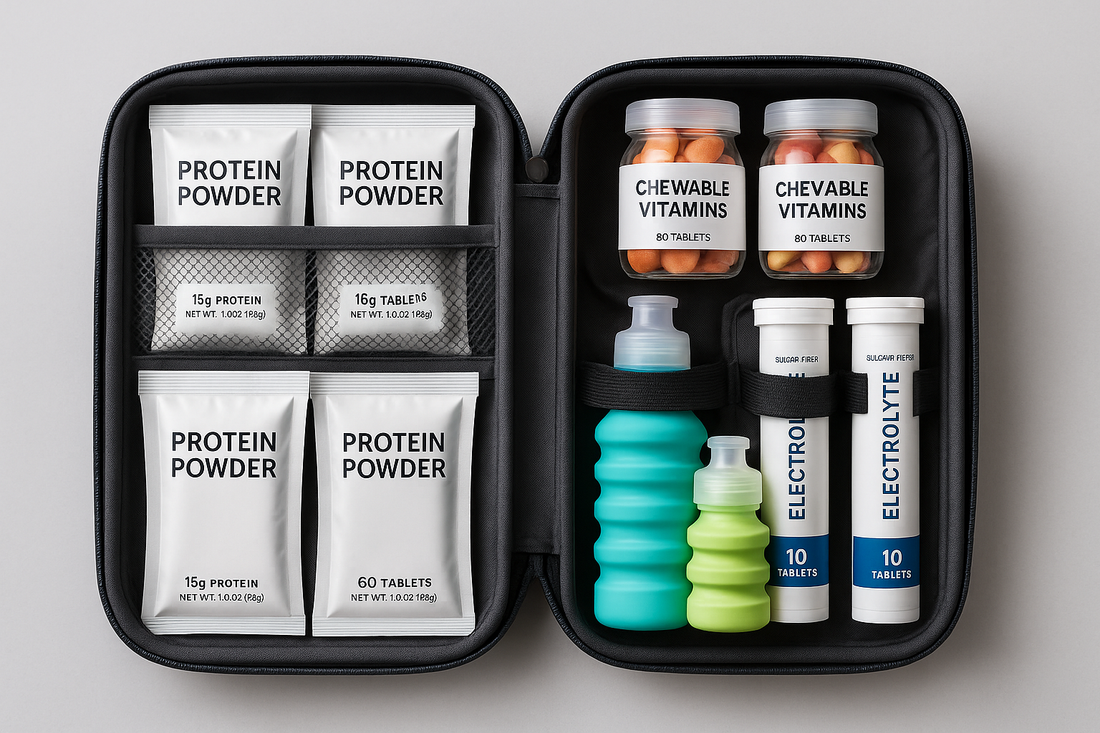
Emergency Nutrition Kits for Bariatric Patients: A Vital Resource for Health on the Go
Share
As the bariatric community continues to grow, the importance of maintaining proper nutrition after weight loss surgery has become increasingly crucial. Bariatric patients face unique dietary challenges, and ensuring access to the right nutrients—even during emergencies or travel—is essential for sustaining health and well-being [ASMBS].
Understanding Bariatric Nutritional Needs
Bariatric surgery, including gastric bypass and sleeve gastrectomy, alters the anatomy of the digestive system, impairing the absorption of essential nutrients like vitamin B12, iron, calcium, and fat-soluble vitamins [NIH]. These malabsorptive effects make it difficult for patients to meet their nutritional requirements through diet alone, especially during travel or unexpected situations.
Environmental disruptions—such as limited access to bariatric-safe meals—can increase the risk of deficiencies, fatigue, or delayed healing [Cleveland Clinic].
Components of an Ideal Emergency Nutrition Kit
Protein-Rich Supplements
Protein is a cornerstone of post-surgical recovery, critical for muscle maintenance, wound healing, and satiety [American Society for Nutrition]. Your kit should include fast-dissolving protein powders, ready-to-drink shakes, or high-quality bariatric protein bars.
Essential Vitamins and Minerals
Bariatric patients require lifelong supplementation, including elevated levels of vitamin B12, calcium citrate, iron, and vitamin D to prevent common deficiencies [Obesity Surgery Journal]. Include a complete bariatric multivitamin and any additional personalized supplements.
Easy-to-Digest Options
Soft, bland, and nutrient-dense options are key for those with post-surgical sensitivities. Items like pureed soups, bone broths, or gelatinized puddings provide calories and hydration without gastrointestinal discomfort [Johns Hopkins Medicine].
Portable Solutions for Bariatric Patients
Compact and Lightweight Design
Use travel-sized or single-serving packages to keep your kit portable. Look for pre-portioned pouches of supplements and protein powders that fit into a carry-on or backpack.
Storage and Transport Considerations
If traveling in warm climates, insulated bags or small coolers help preserve the integrity of liquid vitamins, protein drinks, or perishable snacks. Some bariatric vitamins are shelf-stable and designed for easy transport [Harvard Health].
Serving Size Awareness
Due to the reduced stomach capacity post-surgery, appropriate small portions reduce discomfort and dumping syndrome. Read labels and choose low-sugar, low-fat formulations that meet your tolerance level.
Selecting the Right Emergency Nutrition Supplies
Nutritional Value and Density
Prioritize high bioavailability formulations—like sublingual B12 or fast-dissolving capsules—to enhance absorption and avoid fillers that may irritate your stomach [PubMed].
Compatibility with Bariatric Needs
Avoid supplements with gelatin coatings, sugar alcohols, or carbonation, all of which may cause nausea, bloating, or dumping syndrome in post-op patients [ASMBS Guidelines].
Professional Guidance
Work with a registered dietitian or bariatric specialist to identify brands that are clinically approved for post-operative use, ensuring both safety and efficacy [Mayo Clinic].
Travel Nutrition Strategies
Plan Ahead
Research food options near your destination and pre-pack safe items to avoid reliance on gas station snacks or airline meals. Keep emergency supplements in your carry-on in case of baggage delays.
Smart Packing Tips
Label your supplements and arrange by time of day (e.g., AM/PM) or purpose (e.g., protein, hydration, multivitamin). Use pill organizers, portion bags, or measured scoops for ease of use.
Maintain Nutritional Balance
Even when traveling, aim to include a balance of protein, fat, and fiber. Hydrate regularly with electrolyte-enhanced water or sugar-free beverages to prevent dehydration, a common post-op complication [CDC].
Practical Recommendations
-
Create a Customized Emergency Kit
Tailor your kit to your individual deficiencies, surgery type, and tolerances. Include a written checklist to ensure nothing is forgotten. -
Consult Healthcare Providers Regularly
Update your kit based on lab results, diet evolution, and input from your care team. -
Monitor Your Intake
Keep a travel log or app to track nutrient intake, ensuring you're meeting your protein and supplement needs even on the road.
Conclusion
Emergency nutrition kits aren't just a convenience—they're an essential safeguard for bariatric patients navigating unpredictable situations. Whether you're traveling, camping, or simply caught in a busy workday, these kits help ensure your body continues to receive the vital nutrients it needs to heal, thrive, and maintain weight loss long-term.
With the right planning, proper supplements, and support from trusted providers, bariatric patients can face any situation confidently. At Vita4Life!, we’re proud to support your journey with fast-dissolving, filler-free supplements that are tailored to your needs—whether you’re at home or on the move.
Medical Disclaimer
This content is for informational purposes only and does not constitute medical advice. Always consult your healthcare provider or bariatric team before making changes to your supplement regimen, especially in emergency or travel situations.
